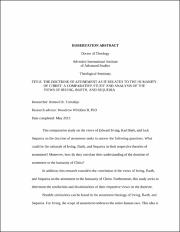The Doctrine of atonement as it relates to the humanity of Christ : a comparative study and analysis of the views of Irving, Barth, and Sequera
Abstract
This comparative study on the views of Edward Irving, Karl Bath, and Jack Sequeira on the doctrine of atonement seeks to answer the following questions: What could be the rationale of Irving, Barth, and Sequeira in their respective theories of atonement? Moreover, how do they correlate their understanding of the doctrine of atonement to the humanity of Christ?
In addition, this research considers the correlation of the views of Irving, Barth, and Sequeira on the atonement to the humanity of Christ. Furthermore, this study seeks to determine the similarities and dissimilarities of their respective views on the doctrine.
Notable similarities can be found in the atonement theology of Irving, Barth, and Sequeira. For Irving, the scope of atonement embraces the entire human race. This idea is supported by Barth, and Sequeira. The idea of universal atonement they adhere to moves beyond the understanding that the atoning sacrifice of Christ is merely provisional but rather objectively realized in Christ.
Irving, Barth, and Sequeira all reject the Penal-Substitutionary model of atonement. They share a common reason that guilt could not be transferred and that the innocent could not suffer for the guilty. They propose that the atonement was accomplished in actuality through Christ‘s assumption of sinful human nature.


